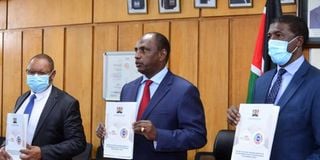Premium
Covid drills Sh42bn hole in tax revenue

Planning PS Saitoti Torome, Treasury Secretary Ukur Yatani and Chief Administrative Secretary Nelson Gaichuhie during the launch of the second voluntary national review on the Sustainable Development Goals report in Nairobi on July 6, 2020.
Tax collections on earnings made by companies and individuals fell by Sh42.83 billion in the first four months of the current financial year ending June 2021, weighed down by depressed economic activity due to Covid-19 crisis.
Income tax receipts amounted to Sh198.21 billion in the July-October 2020 period, a 17.77 per cent drop compared with Sh241.04 billion, according to data the Treasury shared with Central Bank of Kenya.
This was the lowest income tax collection made by the Kenya Revenue Authority (KRA) on corporate profit and workers’ pay in four years when the receipts amounted to Sh177.38 billion in the first four months of the fiscal year ended June 2017.
Monthly income tax receipts have been falling since the beginning of this financial year in July compared with a corresponding period in 2019 amid Covid-induced slowdown in economic activity.
The drop was compounded by a reduction of maximum income tax to 25 from 30 per cent as part of the tax reliefs, which were enforced between May and December 2020 to cushion businesses and families from pandemic blows.
Tax reliefs
The tax cuts, except for low-income workers who earn up to Sh24,000 whose pay will remain tax-free, have since been scrapped, with Treasury secretary Ukur Yatani, arguing they were not sustainable.
The Treasury estimated on December 4 the government forego about Sh65 billion as a result of tax reliefs, including a cut on value-added tax to 14 from 16 per cent.
“The shortfalls in government revenues are as a result of suppressed economic activities due to the pandemic, as well as the tax reliefs implemented in April 2020 to cushion people and businesses from the adverse effects of the pandemic,” said Mr Yatani last November.
The Treasury in October revised income tax target for the current financial year to Sh735.5 billion up from Sh685 billion in June.
Starting this month, the Treasury has imposed a minimum tax at the rate of one per cent of gross sales on all companies, including those in losses, as passed by lawmakers through the Finance Act 2020.
Minimum tax
The legislators also approved the revised tax bands for salaried workers, which will see a maximum pay-as-you-earn of 30 per cent apply from 32,333 compared with Sh47,057 in the pre-Covid-19 period.
The decision to slap a minimum tax on all companies, except insurers and oil marketers, has irked business lobbies.
“The minimum tax is going to be especially destructive for the SMEs and the large companies also because they are bringing on additional tax at a point when people are trying to recover from the hit of the pandemic,” said Kenya Association of Manufacturers chair Mucai Kunyiha.





